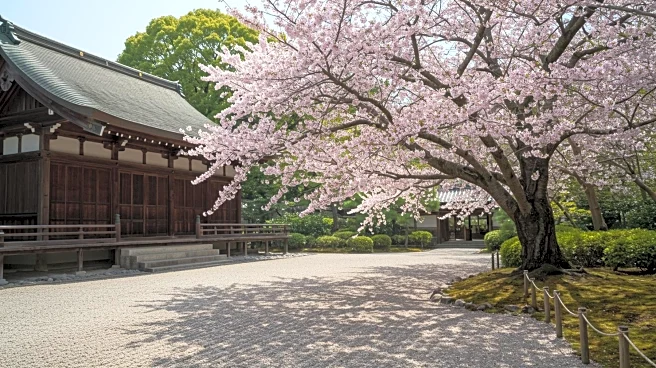What's Happening?
Japan is grappling with historical denialism as it marks the 80th anniversary of its unconditional surrender in World War II. Right-wing groups in Japan are pushing narratives that deny or minimize the wartime atrocities committed by Imperial Japan. These groups claim that Japan's actions during the war were acts of self-defense rather than aggression, and they seek to portray Japan as a victim of foreign conspiracies. This revisionist movement has gained traction, influencing domestic debates and international diplomacy, particularly with countries like China and South Korea, which have bitter memories of Japanese occupation. The controversy is further fueled by Japan's far-right groups, who oppose monuments to 'comfort women' and other reminders of wartime atrocities.
Why It's Important?
The rise of historical denialism in Japan has significant implications for international relations in East Asia. It strains diplomatic ties with countries like China and South Korea, which demand acknowledgment and apology for past aggressions. This denialism also affects Japan's domestic policy, as it influences educational narratives and public perception of history. The movement's growth could lead to increased tensions in the region, impacting trade, security, and diplomatic cooperation. Moreover, it challenges Japan's ability to reconcile with its past, potentially hindering efforts to foster peace and mutual understanding with its neighbors.
What's Next?
Japan faces pressure to address these historical narratives and reconcile with its past. The government may need to engage in diplomatic dialogues with affected countries to mitigate tensions. There is also a possibility of increased activism and protests from civil society groups demanding historical accuracy and accountability. Educational reforms might be considered to ensure that future generations understand the full scope of Japan's wartime actions. Internationally, Japan may face calls to participate in joint historical projects with countries like China and South Korea to promote a shared understanding of history.
Beyond the Headlines
The issue of historical denialism in Japan raises ethical questions about memory, accountability, and the role of education in shaping national identity. It highlights the challenges of balancing national pride with historical truth, and the potential consequences of ignoring past atrocities. The movement also reflects broader global trends of historical revisionism, where countries grapple with uncomfortable aspects of their past. This situation underscores the importance of historical accuracy in fostering international peace and cooperation.









